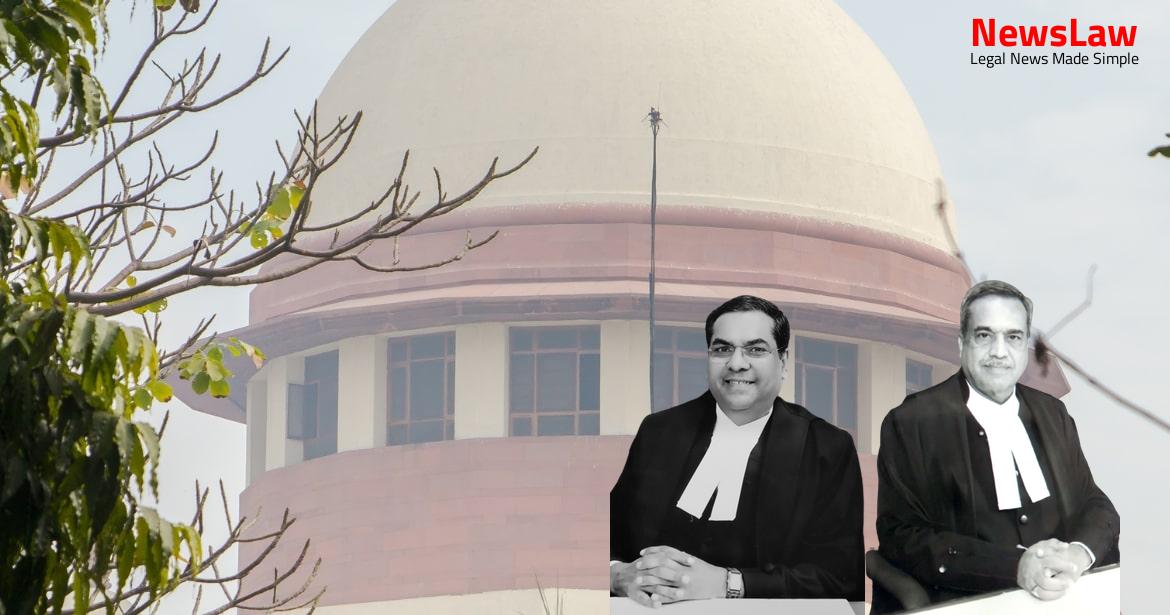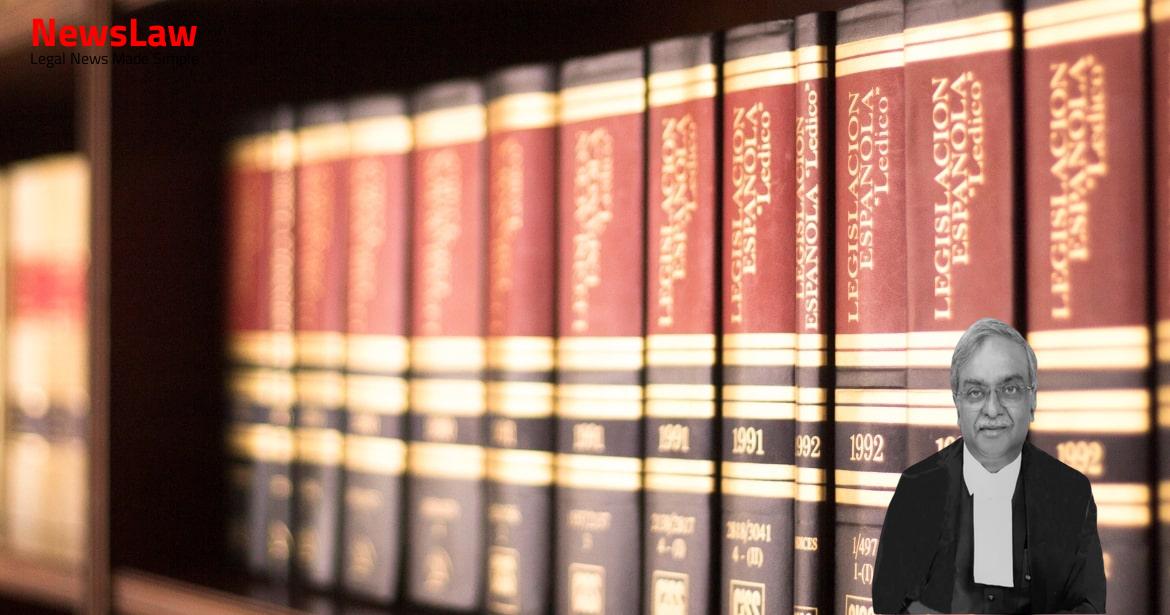Delve into the realm of statutory interpretation and burden of proof as highlighted in a recent legal case. The court’s thorough legal analysis sheds light on the complexities of applying statutory provisions and establishing proof in criminal cases. This case emphasizes the importance of evidentiary standards and the burden of proof in ensuring fair and just outcomes within the legal system.
Facts
- The appellant denied criminal responsibility, claiming sandalwood oil was not a forest produce.
- Prosecution examined four witnesses, while the defense relied on two witnesses.
- A valid license was cited by the appellant authorizing the manufacturing of sandalwood oil.
- Officials seized 460 kgs of sandalwood oil at the airport in January 1994.
- Appellant argued that they processed and exported sandalwood oil, not forest produce.
- The complaint alleged illegal possession and movement of sandalwood oil without a transit license.
- The first appellant, a partner in the firm, claimed to be a manufacturer and trader of sandalwood oil.
- The appeal challenges the Kerala High Court’s decision, which reversed the Sessions Judge’s judgment and restored the conviction under Section 27 of the Kerala Forest Act.
- A criminal complaint was later filed by the State, leading to the seizure of an additional 73.6 kgs of sandalwood oil during a search of the appellants’ premises.
- The appellant was convicted by the High Court based on the presumption under Section 69 of the Act.
- The High Court emphasized the need for the accused to provide a proper account of raw materials used in manufacturing sandalwood oil.
- The High Court rejected the Sessions Court’s findings and held that the appellant’s possession of sandalwood oil required a detailed explanation.
- The appellant’s failure to explain the possession of a large quantity of sandalwood oil was considered a crucial aspect by the High Court in upholding the conviction.
- The High Court highlighted the importance of considering the underlying objectives of the Act, which are for the general public good, in interpreting the law.
- The testimony of PW-4, stating the lack of details regarding procurement of raw materials, was crucial in the High Court’s decision to reverse the Sessions Court’s judgment.
Also Read: Electoral Malpractices in Mayor Election
Arguments
- Appellant discharged burden by producing registers regarding red oil purchases
- Appellant registered under Kerala General Sales Tax Act and Central Sales Tax Act
- Argument that offence only applies to ‘forest produce’
- Firm entitled to possess and deal with sandalwood oil
- Section 69 presumption about forest produce being government property
- Prosecution failed to prove possession of illicitly removed forest produce
- Appellant’s legal exports would not have been permitted if illegal activities occurred
- Appellant had valid license to manufacture sandalwood oil
- Documents proved legal acquisition of raw materials
- Failure to prove source of sandalwood oil was illegal
- Prosecution did not prove illicit removal of forest produce
- No evidence of possession of illicitly removed forest produce
- Department did not prove forest produce was illicitly removed
- No evidence of false entries in registers maintained by appellant
- The respondent’s counsel argued that the onus was on the appellant to prove lawful possession of sandalwood oil.
- Mere statements by the appellant regarding dealing in sandalwood oil were insufficient to discharge the burden of proof.
- The seizure of sandalwood oil from the appellant’s premises established the foundational onus on the State.
- Section 69 presumption was attracted after the State established possession of the forest produce.
- The burden shifted to the appellant to prove legitimate sourcing and lawful possession.
- The reliance on invoices and registers by the appellant was deemed inadequate for proper verification.
- The appellant failed to prove that the forest produce was legitimately sourced and possessed legally.
- The state urged the court to dismiss the appeal and confirm the conviction based on the trial court’s findings.
- Reference was made to the judgment in Forest Range Officer v. P. Mohammed Ali, establishing that ‘forest produce’ includes sandalwood oil.
Also Read: Balancing Power and Transparency: Electoral Bonds Struck Down, Disclosure Mandated
Analysis
- Possession or use of forged or counterfeit currency notes without mens rea is not sufficient to establish an offense under Section 489-C of the Indian Penal Code.
- The presence of the word ‘know’ indicates that mens rea of the offender must be proven.
- Mens rea is crucial in criminal offenses as established in court cases like Umashanker v. State of Chhattisgarh.
- The intent of the legislation in economic offenses related to forged currency is to protect the economy and currency integrity.
- The statutory provisions require proof of ‘knowing or having reason to believe’ for offenses under Sections 489-B and 489-C.
- The use of words like ‘knowing’ or ‘knowingly’ hold more weight than ‘has reason to believe’ in establishing mens rea.
- Legislative definitions are inclusive and not exhaustive, encompassing various types of produces.
- The interpretation of statutes is usually aligned with common law principles unless expressly or implicitly excluding mens rea.
- The High Court’s reliance on precedents like Ghure Lal v. State of Uttar Pradesh regarding appellate interference was noted.
- Purposive interpretations aim to uphold conservation efforts and accountability in possession of valuable assets like sandalwood.
- Expert opinions in legal matters serve as additional evidence but may not dictate the interpretation of statutes.
- The construction of statutory provisions should generally follow common law principles unless expressly or implicitly excluding mens rea.
- In Forest Range Officer v. P. Mohammed Ali, the Kerala Forest Act was interpreted in a case involving sandalwood oil.
- The interpretation concluded that sandalwood oil is considered ‘forest produce’ and falls under the definition of timber.
- Various essential oils, including sandalwood oil, are derived from forest wood and are considered forest produce.
- The Act defines ‘forest’ to include timber, wood-oil, gum, resin, bark, roots of sandalwood and rosewood, among other items.
- Section 27 of the Act outlines the offenses and punishments related to actions such as illegal possession of forest produce and damage to reserved forests.
- The punishment for offenses listed in Section 27 can include imprisonment and fines, along with compensation for damages to the forest.
- The presumption under Section 69 of the Act applies to the ownership of forest produce, not to a conscious mental state or the illicit nature of the goods.
- The State failed to prove beyond a reasonable doubt that the accused had knowledge of the goods’ illicit origin.
- The interference by the High Court with the acquittal recorded by the Sessions Court was found unwarranted.
- The interpretation clause in the Act is meant to extend the meaning of words when ambiguous, not to restrict their ordinary sense.
- The burden of proving foundational facts for the presumption under Section 69 lies on the prosecution.
- The inclusion of sandalwood oil as forest produce was deemed correct in the judgment.
- There was an error in presuming a culpable mental state of the accused based solely on the seizure of goods without further evidence.
- The appellant presented invoices and receipts as evidence of the proper sourcing of the seized goods, which the State failed to discredit.
- The High Court’s misinterpretation of the implications of Section 69 led to errors in reasoning about the accused’s knowledge of the goods’ origin.
- The nature of the presumption under Section 69 does not imply guilt or conscious knowledge by the accused.
- The impugned judgment is deemed to be in error according to the court’s opinion.
- The defense possessed evidence that was not presented in court, nor was the primary evidence to support the state’s claims proven.
- The materials on the record indicate a lack of proper substantiation of the state’s contentions.
- The lack of presentation of key evidence by the defense affected the overall decision of the court.
Also Read: Recall of Resolution Plan Approval: Legal Analysis
Decision
- The appeal was successful
- No order on costs was given
- The decision is set aside
Case Title: BHARATH BOOSHAN AGGARWAL Vs. THE STATE OF KERALA (2021 INSC 621)
Case Number: Crl.A. No.-000834-000834 / 2009



